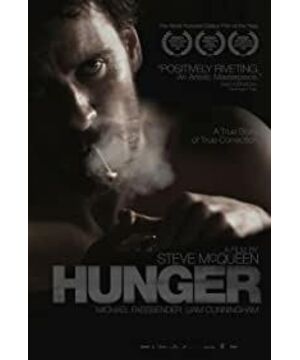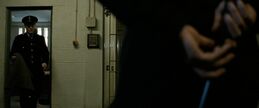McQueen's Hunger has a power to draw understanding out of us.
Before watching this film, I have only a plain knowledge about hunger strike. The film reminds me of narratives I had read before, like, how feminists in England on a Hunger Strike were “enforced” to eat and these enforcements damaged these women’s health “ permanently”. I remember wondering how health could be harmed by enforcing eating, and guessing the damages were caused by irregular diet. Naive of me.
Narrating a historic event generally is more informative but plainly less powerful than the way Hunger deals with it, as Thara points out, too. To actually see the body arouses emotions in the audience way more effectively than intellectual reading, making historic events more authentic than intellectual distant.
However, to see it is still different from to live it, and, inevitably, the spectacle created by McQueen has within it his own purpose to influence the audience. I find it most interesting to draw the political ideas delivered by presentations of bodies. Apparently , McQueen sympathizes and wants us to sympathize with the protestants. Sands's body is the most traumatized one disgusting ulcers and, at the end of the hunger strike, countable ribs. When I saw his body, I could feel how the image is manipulating me to think against Thatcher government. His body makes itself a spectacle displaying a power relation between the British and the nativists, innately condemning the violation of humanity and claiming the justice of their own.
The whole concept of political status was, however, more political than moral. The majority of inmates in the Maze might have supported political status only because of political propaganda and freneticism than political idealism. Before the appearance of Sands, the film is almost in a neutrality, we see sufferings and human elements from both sides and the inmates that first appears does not seem really intelligent.
However, Sands broke this neutrality. The scene with naked bodies and uniformed bodies strikes down the pities that we would have for the other side, although one of them is crying. Then the dialogue between Sands and the Catholic priests build intelligence and compassion to the body of Sands. On the opposite side, the officer sends flowers to her mother, but the scene is not of compassion, but of a sense of alienation and disciplinary indifference. The immobility of his mother makes the officer so unlikable, and the following gory scene brings more horror than compassion, when the immobile mother moves suddenly. when the immobile mother moves suddenly.
Sand's caretaker changed during his last hunger strike for no apparent reason. Implicitly, I feel the next caretaker treats Sands with much less care. It turns out clear with a scene of the ring born by the caretaker, which is inscribed UPA. The body of the UPA member is large and round, his manner arrogant.
The film does try to be objective, but it also tries to arouse sympathy and emotions. While the film sublimes Sands body and characterizes Loyalists and British less noble, it makes me consider whether the hunger strike is still just when the general inmates, political or non-political, have been treated humanely, thanks to, at least partly, the effort of those arguing for political status. When the traumatized body was treated with white and clean clothing, I at once receives a sublime martyr and a less just but even more courageous political figure.
View more about Hunger reviews











